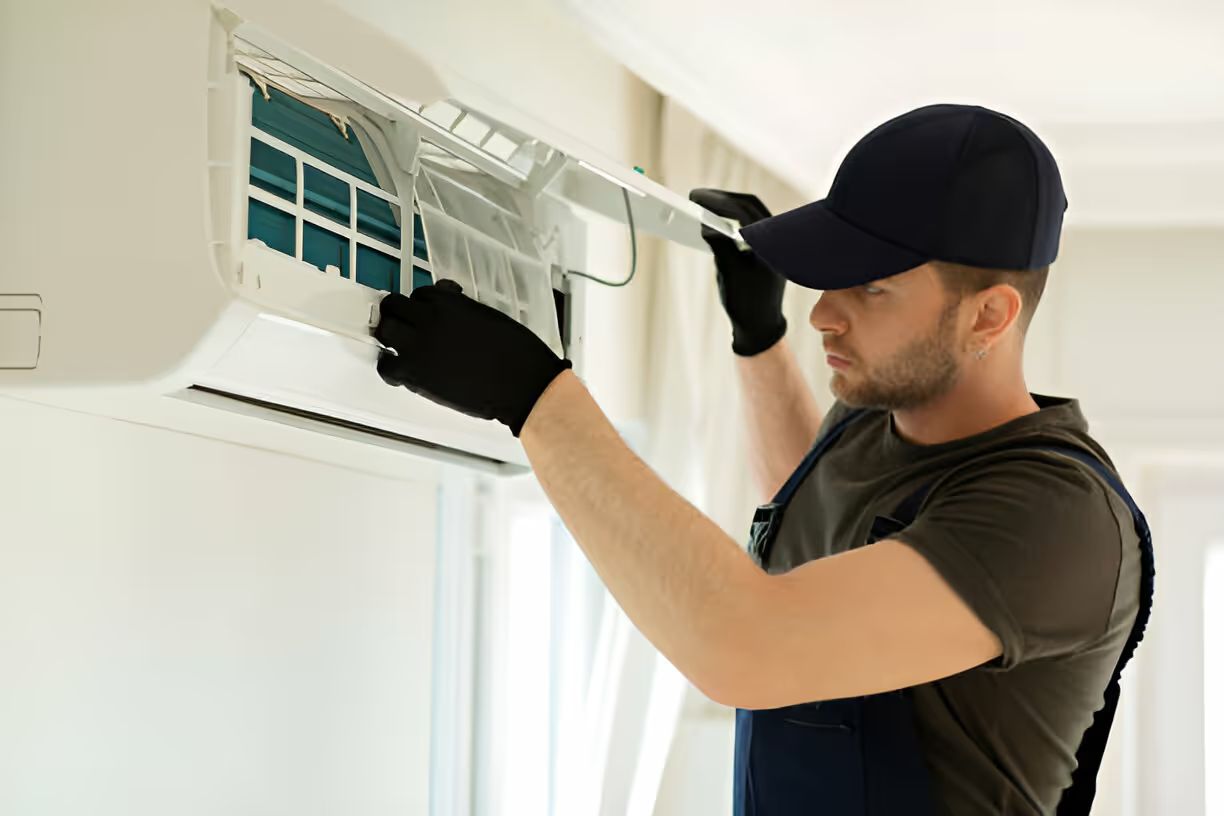Mini-Split Tune-Up in St. Petersburg, FL


Why a Mini-Split Tune-Up Matters in St. Petersburg, FL
Mini-Splits are commonly used here because they provide efficient zoned cooling without duct losses. But St. Petersburg’s hot, humid summers and proximity to saltwater accelerate coil corrosion, clog condensate lines, and encourage biological growth in drain pans and filters. Routine tune-ups reduce breakdowns during peak season, restore cooling capacity, and limit energy waste caused by dirt, leaks, or poor refrigerant charge.
Mini-Split Tune-Up Checklist
A comprehensive tune-up covers visual, mechanical, electrical, and performance checks. Typical inspection and maintenance tasks include:
- Performance testing
- Measure supply and return temperatures, verify sensible cooling capacity, and confirm system cycles properly.
- Airflow checks
- Inspect and measure indoor blower operation, check fan speeds, and verify unobstructed airflow at each air handler.
- Thermostat / controller calibration
- Confirm setpoint accuracy on remote or wall controller, recalibrate sensors if needed, and verify wireless/Smart controls communicate correctly.
- Refrigerant and leak inspection
- Check refrigerant pressures and superheat/subcooling, visually inspect lines and fittings for leaks, and recommend leak repair if pressures are out of range.
- Cleaning coils and filters
- Clean indoor evaporator coils, outdoor condenser coils, and wash or replace filters to restore heat transfer efficiency.
- Condensate system service
- Clear drain lines and check pump operation where applicable to prevent backups and moisture damage.
- Electrical and safety checks
- Tighten connections, inspect capacitors and contactors, confirm proper voltage and amp draw, and check safety controls.
- Corrosion and mounting inspection
- Inspect outdoor unit for salt-related corrosion, ensure proper mounting and line-set insulation, and secure protective covers if present.
- Operational verification
- Run a full-cycle test to verify cooling/heating performance under load and listen for abnormal noises or vibration.
What the Technician Will Do (Process)
A typical tune-up follows a methodical process: start with a system history and previous repair notes, perform visual and safety inspections, measure electrical and refrigerant parameters, clean coils and filters, flush condensate drains, test controls and thermostats, and run performance tests to confirm improvements. Technicians document findings, note recommended repairs, and provide an assessment of system health and expected efficiency gains.
Common Mini-Split Problems in St. Petersburg Homes
- Reduced cooling capacity from dirty coils and clogged filters (common with high local humidity)
- Frequent short-cycling due to improper refrigerant charge or failing controls
- Condensate blockages causing water overflow or mold growth
- Corrosion of outdoor coil fins and connections from salt spray near the bay
- Inaccurate controller sensors or wireless interference in dense neighborhoods
Expected Improvements in Efficiency and Comfort
After a thorough tune-up you can expect:
- Improved cooling output and more consistent room temperatures
- Better indoor air quality from clean filters and coils
- Lower energy consumption through optimized refrigerant charge and reduced blower motor strain
- Fewer unexpected breakdowns during the hottest weeks
- Extended equipment lifespan by addressing issues early
Quantitatively, properly serviced mini-splits often regain several percentage points of efficiency lost to dirt and imbalance; homeowners commonly see noticeable reductions in runtime and improved temperature stability.
Recommended Frequency for St. Petersburg, FL
Because of the local climate, recommended frequency differs from drier climates:
- Minimum: once per year for lightly used systems
- Recommended: every 6 months for typical St. Petersburg homes (spring and late summer) to prepare for heavy cooling loads and to clear humidity-driven buildup
- High-use or coastal homes: quarterly inspections are prudent if the system serves critical areas or is exposed to heavy salt spray
Regular seasonal tune-ups reduce peak-season failures and help spot corrosion or refrigerant issues before they worsen.
Estimated Time and Typical Cost
- Estimated time on site: most full mini-split tune-ups take between 60 and 90 minutes per indoor/outdoor pairing, depending on system accessibility, number of indoor heads, and how much cleaning is required.
- Typical cost range: tune-up pricing varies by service depth and local market, but many homeowners should expect a routine tune-up to fall within a modest range that reflects inspection, basic cleaning, testing, and diagnostic labor. More extensive repairs (refrigerant repairs, coil replacement, or corrosion mitigation) are priced separately.
Booking & Pre-appointment Information
Scheduling a tune-up usually involves confirming the number of indoor units, system brand/model, and preferred appointment windows. Typical booking logistics include:
- Selecting an appointment window with an estimated technician arrival time
- Providing safe access to indoor units, closets, or attic spaces if required
- Noting special site conditions such as gated properties or pets
- Expecting the technician to perform a system walk-through and a brief service summary at completion
Technicians often advise performing tune-ups outside peak heat hours to minimize discomfort during testing.
Maintenance Tips to Maximize Longevity
- Clean or replace filters monthly during heavy-use months
- Keep outdoor units clear of vegetation and rinse salt spray from coils after storms
- Verify condensate lines are unobstructed and that drip pans remain dry
- Use timers or thermostats to avoid unnecessary run time during mild weather
- Schedule regular tune-ups more frequently if your mini-split operates nearly year-round
A proactive maintenance plan tailored to St. Petersburg’s climate preserves comfort, reduces energy costs, and minimizes the risk of emergency repairs during the hottest days of summer.
Service Areas


